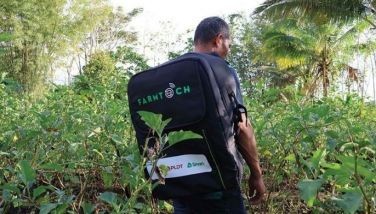DAR to extend health care to farmers
December 31, 2002 | 12:00am
Some three million agrarian reform beneficiaries (ARBs), or 15 million individuals from rural households are expected to be enrolled to the National Health Insurance Program (NHIP) after the Department of Agrarian Reform (DAR) forged a partnership with Philhealth in an effort to develop community-based social health insurance schemes in the countryside.
In signing two separate memorandum of agreements (MOA), the DAR and Philhealtth aimed to assure farmers of a better access to quality and affordable health care services for their families.
The first MOA signed between the DAR and Philhealth have defined the framework, processes and operating guidelines of the partnership under the Greater Medicare Access Bayan-Anihan program, while the second MOA established a tie-up with four Health District Boards under the Indigency Program, covering the Belgian Integrated Agrarian Reform Support Programme (BIARSP) areas.
According to the DAR, the project shall also serve as an enabling strategy or mechanism to interface health reform initiatives within the overall context of agrarian reform and rural development.
It shall be implemented in two phases from 2002 to 2008 with four possible models such as DAR-Agraryong Pangkalusugan; DAR-Philhealth Scheme; Advocacy for Enrollment of ARB’s under Philhealth’s Indigency Program; and Advocacy for Enrollment of ARBs under Philhealth’s Individual Paying Program.
Pilot-testing of the models will be conducted in various Agrarian Reform Communities (ARCs) and non-ARCs.
"With the signing of the MOA, farmers are brought to the mainstream of government agenda of providing universal coverage of the social health insurance program," noted Agrarian Reform Secretary Hernani Braganza.
Under the MOA, the Philhealth shall provide the technical assistance in the enrollment of program beneficiaries, facilitate accreditation of public health institutions, collect funds from the Department of Budget and Management to finance the national government premium subsidy and from the local government units/district health boards; and ensure the prompt disbursement of funds for the payment of approved claims.
The DAR, for its part, shall facilitate the enrollment of the ARBs; and identify the ARCs to be covered under the various models for the pilot implementation among others.
The DAR and Philhealth has agreed on a 50-50 cost-sharing scheme to sufficiently cover the required budget of P10 million for the implementation of the program.
In signing two separate memorandum of agreements (MOA), the DAR and Philhealtth aimed to assure farmers of a better access to quality and affordable health care services for their families.
The first MOA signed between the DAR and Philhealth have defined the framework, processes and operating guidelines of the partnership under the Greater Medicare Access Bayan-Anihan program, while the second MOA established a tie-up with four Health District Boards under the Indigency Program, covering the Belgian Integrated Agrarian Reform Support Programme (BIARSP) areas.
According to the DAR, the project shall also serve as an enabling strategy or mechanism to interface health reform initiatives within the overall context of agrarian reform and rural development.
It shall be implemented in two phases from 2002 to 2008 with four possible models such as DAR-Agraryong Pangkalusugan; DAR-Philhealth Scheme; Advocacy for Enrollment of ARB’s under Philhealth’s Indigency Program; and Advocacy for Enrollment of ARBs under Philhealth’s Individual Paying Program.
Pilot-testing of the models will be conducted in various Agrarian Reform Communities (ARCs) and non-ARCs.
"With the signing of the MOA, farmers are brought to the mainstream of government agenda of providing universal coverage of the social health insurance program," noted Agrarian Reform Secretary Hernani Braganza.
Under the MOA, the Philhealth shall provide the technical assistance in the enrollment of program beneficiaries, facilitate accreditation of public health institutions, collect funds from the Department of Budget and Management to finance the national government premium subsidy and from the local government units/district health boards; and ensure the prompt disbursement of funds for the payment of approved claims.
The DAR, for its part, shall facilitate the enrollment of the ARBs; and identify the ARCs to be covered under the various models for the pilot implementation among others.
The DAR and Philhealth has agreed on a 50-50 cost-sharing scheme to sufficiently cover the required budget of P10 million for the implementation of the program.
BrandSpace Articles
<
>
- Latest
- Trending
Trending
Latest























